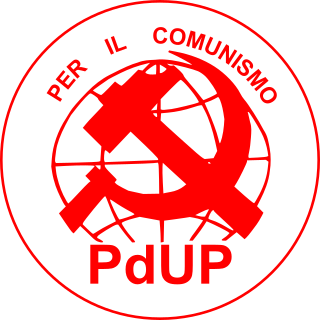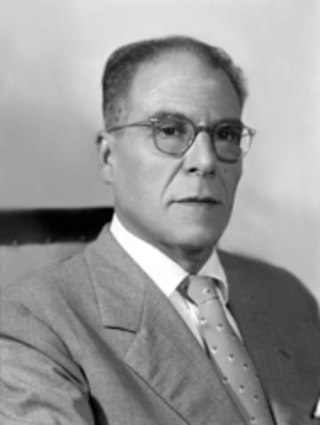Related Research Articles

Enrico Berlinguer was an Italian politician and statesman. Considered the most popular leader of the Italian Communist Party (PCI), he led the PCI as the national secretary from 1972 until his death during a tense period in Italy's history, which was marked by the Years of Lead and social conflicts, such as the Hot Autumn of 1969–1970. Berlinguer was born into a middle-class family; his father was a socialist who became a deputy and later senator. After leading the party's youth wing in his hometown, he led the PCI's youth wing, the Italian Communist Youth Federation (FGCI), at the national level from 1949 to 1956. In 1968, he was elected to the country's Chamber of Deputies, and he became the leader of the PCI in 1972; he remained a deputy until his death in 1984. Under his leadership, the number of votes for the PCI peaked. The PCI's results in 1976 remain the highest for any Italian left-wing or centre-left party both in terms of votes and vote share, and the party's results in 1984, just after his death, remain the best result for an Italian left-wing party in European elections, and were toppled, in terms of vote share in a lower-turnout election, in the 2014 European Parliament election in Italy.

The Italian Communist Party was a communist and democratic socialist political party in Italy. It was founded in Livorno as the Communist Party of Italy on 21 January 1921, when it seceded from the Italian Socialist Party (PSI), under the leadership of Amadeo Bordiga, Antonio Gramsci, and Nicola Bombacci. Outlawed during the Italian fascist regime, the party continued to operate underground and played a major role in the Italian resistance movement. The party's peaceful and national road to socialism, or the Italian road to socialism, the realisation of the communist project through democracy, repudiating the use of violence and applying the Constitution of Italy in all its parts, a strategy inaugurated under Palmiro Togliatti but that some date back to Gramsci, would become the leitmotif of the party's history.

Palmiro Michele Nicola Togliatti was an Italian politician and statesman, leader of Italy's Communist party for nearly forty years, from 1927 until his death. Born into a middle-class family, Togliatti received an education in law at the University of Turin, later served as an officer and was wounded in World War I, and became a tutor. Described as "severe in approach but extremely popular among the Communist base" and "a hero of his time, capable of courageous personal feats", his supporters gave him the nickname il Migliore. In 1930, Togliatti renounced Italian citizenship, and he became a citizen of the Soviet Union. Upon his death, Togliatti had a Soviet city named after him. Considered one of the founding fathers of the Italian Republic, he led Italy's Communist party from a few thousand members in 1943 to two million members in 1946.

Luigi Longo, also known as Gallo, was an Italian communist politician and general secretary of the Italian Communist Party from 1964 to 1972. He was also the first foreigner to be awarded an Order of Lenin.

The Sammarinese Communist Party was a Marxist political party in the small European republic of San Marino. It was founded in 1921 as a section of the Communist Party of Italy (PCI). The organization existed for its first two decades as an underground political organization.

The Sardinian Action Party is a Sardinian nationalist, regionalist and separatist political party in Sardinia. While being traditionally part of the Sardinian centre-left, the party has also sided with the centre-right coalition and, more recently, with the League.

The Proletarian Unity Party was a far-left political party in Italy.

Antonio Giolitti was an Italian politician and cabinet member. He was the grandson of Giovanni Giolitti, the well-known liberal statesman of the pre-fascist period who served as Prime Minister of Italy five times.

Gerardo Chiaromonte was an Italian communist politician, engineer, journalist, and writer.

Lega Sardegna, whose complete name is Lega Sardegna per Salvini Premier, is a regionalist and Sardinian nationalist political party active in Sardinia, Italy.
Project Republic of Sardinia is a regionalist, Sardinian nationalist, social democratic and separatist political party in Sardinia, founded in January 2011 following a split from Independence Republic of Sardinia (iRS).

Sardinian nationalism or also Sardism is a social, cultural and political movement in Sardinia calling for the self-determination of the Sardinian people in a context of national devolution, further autonomy in Italy, or even outright independence from the latter. It also promotes the protection of the island's environment and the preservation of its cultural heritage.

Ruggero Grieco was an Italian politician, antifascist, and member of the Italian Communist Party. He was born in Foggia, Apulia.

The Communist Refoundation Party is a communist political party in Italy that emerged from a split of the Italian Communist Party (PCI) in 1991. The party's secretary is Maurizio Acerbo, who replaced Paolo Ferrero in 2017. Armando Cossutta was the party's founder, while Fausto Bertinotti its longest-serving leader (1994–2008). The latter transformed the PRC from a traditional communist party into a collection of radical social movements.

The Communist Party of Italy (Marxist–Leninist) was a political party in Italy. It was at one time Italy's largest Maoist group, until it changed affiliation and sided with Albania.

The Brigate Garibaldi or Garibaldi Brigades were partisan units aligned with the Italian Communist Party active in the armed resistance against both German and Italian fascist forces during World War II.

The Party of the Christian Left was a political party in Italy founded in 1939 by Franco Rodano and Adriano Ossicini.

Velio Spano was a Sardinian-born antifascist activist and, at times, fighter through the Mussolini years. He is also remembered for his writings: he later came to be identified, increasingly, as a journalist. After the leader fell from power in 1943 and Italy was liberated in 1945, he became an increangly mainstream politician, serving as a member of the senate between 1948 and 1963, and playing an increasingly prominent leadership role in the Communist Party.
Paolo Spriano was an Italian historian of the Italian labor and communist movement.